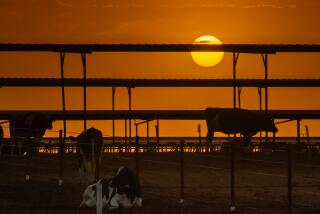Condors Inoculated for West Nile Virus
Wildlife officials have launched an intensive effort to vaccinate California condors against the West Nile virus, which has killed thousands of birds on the East Coast and could possibly decimate the vulnerable condor population as the virus heads west.
“So far we have had only isolated incidents on the West Coast, but this has the potential to be extraordinarily scary, especially with only 205 birds,” said Bruce Palmer, coordinator of the California Condor Recovery Program for the U.S. Fish and Wildlife Service. “We can’t take any chances.”
The mosquito-borne virus has so far killed 4,133 wild or captive birds. Penguins, flamingos, eagles, hawks, owls, crows and waterfowl are especially vulnerable, officials said.
In response, the Los Angeles Zoo has already inoculated 10 of its 32 California condors. The San Diego Zoo is vaccinating its condors. So far, the birds are standing up well to the injections with no side effects reported.
“We are focusing on the captive birds first because they are the reproductive ones,” said Cynthia Stringfield, an L.A. Zoo veterinarian. “By early spring, we hope to vaccinate all the wild birds.”
The experimental vaccine uses the DNA of the West Nile virus rather than a live or dead virus. This is supposed to reduce the chance of a condor getting sick or actually contracting the disease through the process. But giving shots to captive birds is one thing; doing it in the wild is something else. Condors live in remote stretches of the Grand Canyon, Big Sur and Los Padres National Forest near Fillmore. They are monitored by satellite transmitters fastened to their bodies. Tracking, trapping and vaccinating them will require a major effort.
“We will certainly give this our best shot. We have 21 birds out there,” said Greg Austin, a director with the U.S. Fish and Wildlife Service at Hopper Mountain National Wildlife Refuge in Los Padres National Forest. “The first 15 might be easy, and the last six could take six months.”
More to Read
Sign up for Essential California
The most important California stories and recommendations in your inbox every morning.
You may occasionally receive promotional content from the Los Angeles Times.










